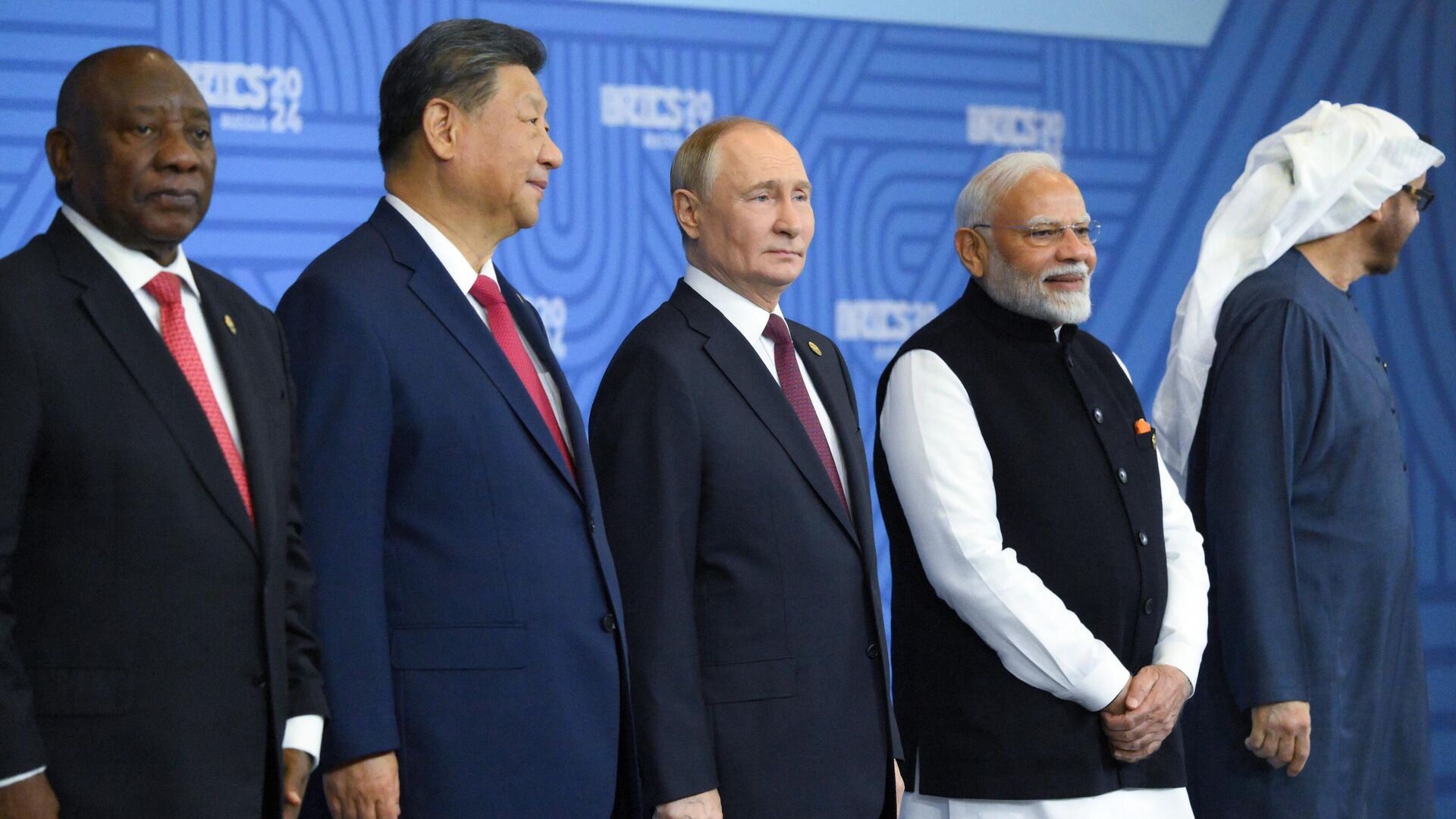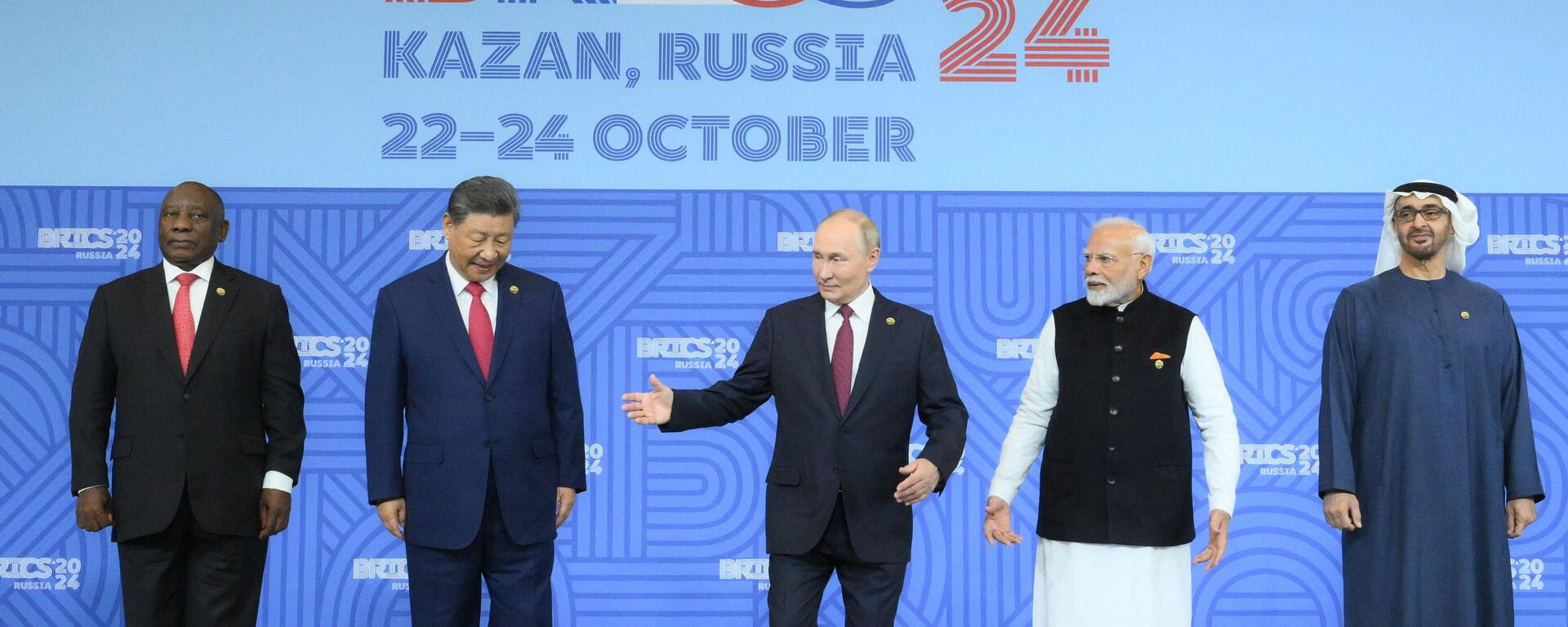https://sputniknews.in/20241024/nations-look-up-to-brics-frustrated-by-western-financial-institutions-8318518.html
Nations Look up to BRICS, Frustrated by Western Financial Institutions
Nations Look up to BRICS, Frustrated by Western Financial Institutions
Sputnik India
There are significant expectations of BRICS, as many developing countries express frustration with Western institutions like the World Bank and IMF, which are... 24.10.2024, Sputnik India
2024-10-24T07:51+0530
2024-10-24T07:51+0530
2024-10-24T19:39+0530
sputnik opinion
government of india
ministry of external affairs (mea)
narendra modi
vladimir putin
brics summit 2024
kazan brics summit
brics currency
brics expansion
us
https://cdn1.img.sputniknews.in/img/07e8/0a/18/8320367_0:0:3211:1807_1920x0_80_0_0_8bab76587e8298a9774f7f71da3b36c9.jpg
BRICS will serve as a distinctive platform for dialogue, cooperation, and coordination, Indian Prime Minister Narendra Modi remarked at the closed plenary of the 16th BRICS Summit in Russia's Kazan.Modi highlighted significant expectations for BRICS and its potential to contribute positively across various domains. He also emphasised the necessity of united and unwavering support from everyone to combat terrorism and its financing.There is no room for double standards regarding this critical issue, according to the prime minister, who also called for proactive measures to prevent the radicalisation of youth.BRICS aims to address economic uncertainty and conflict in a manner perceived as fair and impartial, particularly when contrasted with Western interventions, Ash Narain Roy, director of the Institute of Social Science, told Sputnik India.BRICS represents a grouping of Global South countries, each with unique aspirations and challenges that must be addressed democratically, allowing all members to participate actively, he asserted.“BRICS embraces a new paradigm where contributions are reciprocal; no one is solely a donor or a recipient,” highlighting the shift away from the traditional donor-recipient model, Roy asserted.Roy noted the frustration among developing countries with Western institutions like the World Bank and IMF, which are often viewed as unfair. In contrast, BRICS offers an alternative to these hegemonic global organizations, promoting a platform that emphasises equity, democracy, and fairness, he concluded.Western countries have developed a tendency to sanction nations that do not align with their narratives, something that can be considered economic terrorism and that affects global supply chains, SB Asthana, retired major general and international strategic and military analyst, told Sputnik India.The situation presents an opportunity for BRICS to create arrangements that counter these sanctions, such as facilitating trade in national currencies, he suggested.High Expectations of BRICS Amid Discontent with Western InstitutionsBRICS can play a crucial role in facilitating discussions on terrorism that prioritise fair solutions for developing nations, avoiding the double standards often seen in global discourse, Asthana highlighted.BRICS could create a structure like the Regional Anti-Terrorist Structure (RATS) to establish clear rules for condemning terrorism and addressing funding, he proposed.Based on the previous summit and other meetings leading up to this gathering, there is strong belief that BRICS nations will advocate for peaceful conflict resolution in both Europe and West Asia, while also working to eliminate barriers to international economic growth, particularly for members of the Global South, Rajiv Bhatia, ex-ambassador and distinguished fellow at the Gateway House Indian Council on Global Relations, told Sputnik India.*Terrorist organisations banned in Russia and other countries
https://sputniknews.in/20241023/you-like-living-in-your-city-brics-may-say-why-you-do-or-dont-8313445.html
us
brazil
china
Sputnik India
feedback.hindi@sputniknews.com
+74956456601
MIA „Rossiya Segodnya“
2024
Swapna Nair
https://cdn1.img.sputniknews.in/img/07e7/09/12/4320104_0:0:681:681_100x100_80_0_0_ca8a7d4d582609272840ffdd1cde7278.jpg
Swapna Nair
https://cdn1.img.sputniknews.in/img/07e7/09/12/4320104_0:0:681:681_100x100_80_0_0_ca8a7d4d582609272840ffdd1cde7278.jpg
News
en_IN
Sputnik India
feedback.hindi@sputniknews.com
+74956456601
MIA „Rossiya Segodnya“
Sputnik India
feedback.hindi@sputniknews.com
+74956456601
MIA „Rossiya Segodnya“
Swapna Nair
https://cdn1.img.sputniknews.in/img/07e7/09/12/4320104_0:0:681:681_100x100_80_0_0_ca8a7d4d582609272840ffdd1cde7278.jpg
government of india, ministry of external affairs (mea), narendra modi, vladimir putin, brics summit 2024, kazan brics summit , brics currency, brics expansion, us, us state department, us supreme court, us congress, s. jaishankar, brazil, china, terrorism, cross-border terrorism, counter-terrorism, terrorist attack, territorial integrity
government of india, ministry of external affairs (mea), narendra modi, vladimir putin, brics summit 2024, kazan brics summit , brics currency, brics expansion, us, us state department, us supreme court, us congress, s. jaishankar, brazil, china, terrorism, cross-border terrorism, counter-terrorism, terrorist attack, territorial integrity
Nations Look up to BRICS, Frustrated by Western Financial Institutions
07:51 24.10.2024 (Updated: 19:39 24.10.2024) There are significant expectations of BRICS, as many developing countries express frustration with Western institutions like the World Bank and IMF, which are regarded as unfair and not treating them as equal partners, experts say.
BRICS will serve as a distinctive platform for dialogue, cooperation, and coordination, Indian Prime Minister Narendra Modi remarked at the closed plenary of the 16th BRICS Summit in Russia's Kazan.
Modi highlighted significant expectations for BRICS and its potential to contribute positively across various domains. He also emphasised the necessity of united and unwavering support from everyone to combat terrorism and its financing.
There is no room for double standards regarding this critical issue, according to the prime minister, who also called for proactive measures to prevent the radicalisation of youth.
BRICS aims to address economic uncertainty and conflict in a manner perceived as fair and impartial, particularly when contrasted with Western interventions, Ash Narain Roy, director of the Institute of Social Science, told Sputnik India.
"This is where BRICS distinguishes itself from other organizations that are military-oriented or rooted in Cold War dynamics, such as NATO and the G7," Roy further pointed out the need for a framework that promotes equity and equal opportunities for growth, allowing all members of the Global South to benefit.
BRICS represents a grouping of Global South countries, each with unique aspirations and challenges that must be addressed democratically, allowing all members to participate actively, he asserted.
“BRICS embraces a new paradigm where contributions are reciprocal; no one is solely a donor or a recipient,” highlighting the shift away from the traditional donor-recipient model, Roy asserted.
This inclusive approach is well-suited to tackle the complex challenges facing BRICS and developing countries, making it a thoughtful and effective strategy for fostering cooperation and addressing multiple crises, according to Roy.
Roy noted the frustration among developing countries with Western institutions like the World Bank and IMF, which are often viewed as unfair. In contrast, BRICS offers an alternative to these hegemonic global organizations, promoting a platform that emphasises equity, democracy, and fairness, he concluded.
Western countries have developed a tendency to sanction nations that do not align with their narratives, something that can be considered economic terrorism and that affects global supply chains, SB Asthana, retired major general and international strategic and military analyst, told Sputnik India.
The situation presents an opportunity for BRICS to create arrangements that counter these sanctions, such as facilitating trade in national currencies, he suggested.
Given that the global economy is currently dominated by the dollar and the SWIFT system, the general mentioned that there is a pressing need for an alternative framework, and by integrating banking systems and digitised payments among BRICS nations, today's economic challenges could be addressed.
High Expectations of BRICS Amid Discontent with Western Institutions
BRICS can play a crucial role in facilitating discussions on terrorism that prioritise fair solutions for developing nations, avoiding the double standards often seen in global discourse, Asthana highlighted.
BRICS could create a structure like the Regional Anti-Terrorist Structure (RATS) to establish clear rules for condemning terrorism and addressing funding, he proposed.
"Western nations often evaluate global issues through their national interests, selectively labelling certain groups as terrorists", Asthana added noting that "while groups like LeT [Lashkar-e-Taiba*] and JeM [Jaish-e-Mohammed*] targeting India weren't classified as terrorist organisations until recently, Al-Qaeda* received immediate designation".
Based on the previous summit and other meetings leading up to this gathering, there is strong belief that BRICS nations will advocate for peaceful conflict resolution in both Europe and West Asia, while also working to eliminate barriers to international economic growth, particularly for members of the Global South, Rajiv Bhatia, ex-ambassador and distinguished fellow at the Gateway House Indian Council on Global Relations, told Sputnik India.
"This business of solidarity on counterterrorism is an essential part of BRICS DNA and as BRICS expands from five to ten members and move into multipolarity, it will likely garner even more support" the former diplomat stressed.
*Terrorist organisations banned in Russia and other countries



